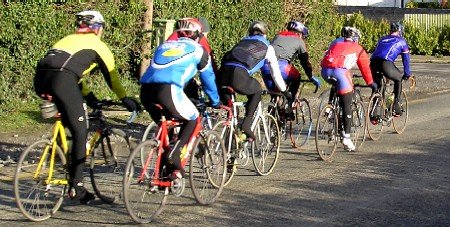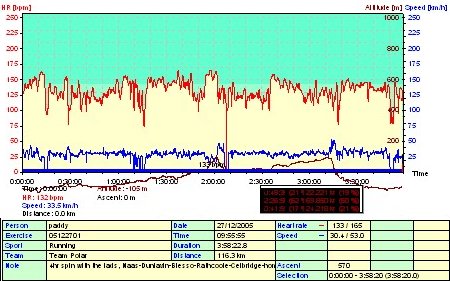
|
 |
|
Last Updated: 3 Jul 2021 - 10:52:54 AM |
EARLY SEASON TRAINING ADVICE
By Paddy Doran, CI Coach of the Year 2005
28 Dec 2011,
|
Email this article
|
What have Alberto Contadore, Andy and Frank Schleck, Lance Armstrong, Miguel Inurain, Stephen Roche, Sean Kelly, Eddy Mercx and Jacques Anquetil got in common? They all did it!
Getting in the miles in January and February
A tradition and principle that has never really changed and probably will never change is the mileage that all the great champions mentioned above completed to build up their condition for the racing season. There is simply no substitute for this period of training and whether the goal is to a Tour De France or the local club league it is essential to the success of a cycling season. This period is also essential for mountain bikers and track riders.
 |
| A nice pleasant day in January for getting in the miles with a good well disciplined group |
At this time of the season you should already be in good physical shape from general training during the previous few months and be ready to move on to more specific training to increase your specific fitness and training base for the competition season.
Saturday and Sunday club training groups are now organized, with a gradual increase in the distance of training sessions.
 |
| Well stocked with energy food for a long session |
The majority of this training is carried out on low to medium sized gears (90 - 100 rpm) The training should be mainly carried out at comfortable speeds on flat to undulating roads. To receive maximum training benefits the group must be disciplined with no big battles on the road. The place to prove your ability is in the races.
Note how they are well wrapped up in warm clothing and all have drinks on the bikes and food in their pockets to keep the muscles fuelled throughout the session. They are also cycling at a comfortable speed.
HOW MUCH SHOULD YOU INCREASE THE AMOUNT OF TRAINING BY?
Increases in the amount of training should be a maximum of ten percent in any week. If you are leading a sporting lifestyle your body will adapt to these increases. Higher increases than ten percent increases the risk of over training.
The ten per cent rule also gives you an opportunity to plan your training according to your current fitness. EG if you are only capable of doing two hours now there is not much point in doing four hours with your local group. It is much more sensible and beneficial in cases like this to gradually increase the amount of training over a longer period using the ten percent rule.
If you have followed a good fitness programme during November and December you can aim to have your longest sessions about the middle to end of February. If you have had a long lay off from training and are only beginning to train now you will need to have a longer build up.
MAXIMUM DURATION:
Four hours should be a reasonable target for most riders who wish to participate in a domestic racing season.
INCREASING THE GEARS AND INTENSITY:
Even though the long steady miles are the basis of all the cycling disciplines and will take up the majority of training time for endurance riders, as fitness improves some fast efforts on higher gears, will be progressively included during the training spins.
These efforts will progress from (controlled) long efforts (10 x 30 minutes) at 75 to 90 % heart rate to shorter sprint type efforts in the last few weeks before your first race. Also some hillier routes will be used (to improve strength endurance) for a small percentage of the training during this period.
Other training activities will be continued midweek until the evenings become bright enough to go out cycling. The main emphasis is on specific training. Gradually reduce the amount of general training as the brighter evenings and weather allow.
WARNING:
You need a reasonable conditioning period before you introduce the more intensive sessions. In other words if you have not trained since the end of last season and are only getting back on your bike now you need at least two months of aerobic training to prepare your body for more intensive efforts.
WEEKEND TRAINING SESSIONS:
For the amateur rider the weekend is where the bulk of the training hours occur. So it is very important to get the right balance on this. Try to get your longest spin in on Saturday in case that you are unable to get out on Sunday because of weather conditions. You can then do some alternative training on Sunday if unable to get out on the road.
CONTROL THE TRAINING INTENSITY:
 |
| This is a heart rate graph of a four hour training session. Heart rates are mostly between 130 -150 bpm for this rider |
Control of the training load is very important if you are to gain full benefit of the training. Decide on personal training intensities with the assistance of a qualified and experienced coach.
Try to make an appointment with a human performance laboratory for a performance test. Usually you will also get medical checks and blood tests included with these tests. This will give you good information to base your training intensities on.
Where you can access Physiological tests:-
* Dept of Physiology Cork University. Phone: 021 4903000
* Trinity College Dept of Anatomy Phone: 01 6081182 email: anatomy@tcd.ie
* Tralee I.T Dept of Health and Sport Sciences. web site: www.ittralee.ie
* National Coaching And Training Centre Limerick University Tel 061 202895 Fax 061 202868 e-mail: nctc@ul.ie
* Queens University Belfast For further information please contact William Moore on 028 90387665 or w.moore@qub.ac.uk
THE INDIVIDUAL TRAINING SESSION:
Pre - training preparation. Prepare for all training sessions the same way as you would (or should) for a race
- Get adequate sleep and rest
- Have optimal nutrition before, during and after training
- Keep your bicycle equipment in good condition
- Have some goals for each session (you should know exactly what you wish to achieve for each session)
- Warm up and Cool down at the start and finish of each session.
TRAINING TIPS FOR THE PREPARATION PERIOD:
- Get advice and a written personal programme from an experienced coach before starting out on a training plan.
- Try to keep a balance in your life, sport, work, family life, relaxation, rest, nutrition etc
- Train with a reliable, disciplined group.
- Use mudguards to protect yourself, clothing and bike from wet roads
- Progressively increase the distance and gears as fitness improves.
- Be patient, let your form come to you slowly it will last longer then, do not force things.
- Go to bed for an hour or two after your long spins Saturday and Sunday
- If the weather is extremely cold or the roads are icy , shorten or cancel the road sessions, supplement with home trainer, gym jogging etc or it may be possible to participate in some cyclo cross or mountain bike training.
- Give full commitment to each training session.
---- JUNIORS (male and female) ----
Strength training needs to be very progressive and according to your fitness levels, junior riders or younger must be very careful with strength training. Their bones and tendon attachment points especially are not fully formed and can be injured by very high loading.
Juniors should not do very high load, low cadence specific strength training sessions on the bike. A more moderate version of this training is acceptable and will be beneficial to juniors.
Learning good pedaling technique and development of high cadence pedaling is more important at the junior age.
Select your training groups very well.
Work with a knowledgeable coach or mentor.
|
|
 |

|